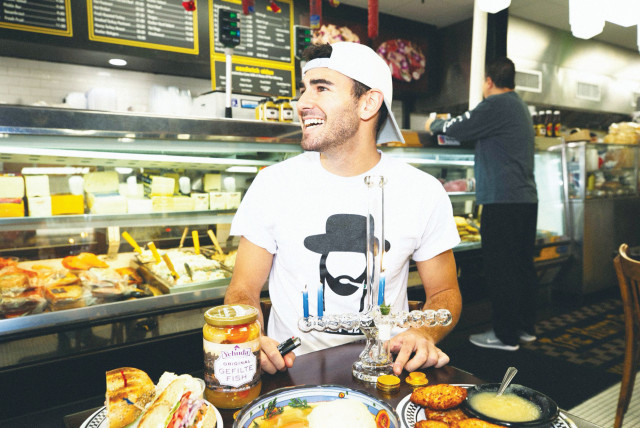Why are Jewish ‘influencers’ being asked to answer for Israel’s war?

Jewish creators – or at least those who verbalize that part of their identity – and brands, have become tasked with answering for the events happening in Gaza amid the Israel-Hamas war.
Where there’s smoke, there’s fire – or at least that’s how it feels to Jewish content creators in a post-October 7 world. In a period of rising rampant antisemitism, entrepreneurs and social media content creators whose brands, in the public eye, are apolitical, are being asked to answer for the war between Israel and Hamas in the Gaza Strip. The reason, they are tasked with this burden, they say, is because they are Jewish.
Being visibly Jewish – however one interprets that word in this context – digital creatives are finding themselves the targets of harassment. Others are losing business opportunities followers and because of their association with words like “Jew.” Creators who thrived off of engagement with followers are now changing their ways as a result of being targeted in their comment sections and by private messages in their inboxes, filled with accusations, insults, and threats.
Online creators know that putting themselves on a platform opens space for scrutiny. However, cyberbullies aside, they would have thought that they would be highlighted for whatever art they are sharing, instead of issues that are ultimately irrelevant to their brands.
October 7 and the days, weeks, and months that followed it were a test of the “worthiness” of their brands, particularly from the perspective of the anti-Israel and antisemitic crowds.
Jewish creators – or at least those who verbalize that part of their identity – and brands, have become tasked with answering for the events happening in Gaza amid the Israel-Hamas war.
This is not a job they asked for, and many are open about their personal inability to speak on behalf of Israel’s policies. They simply identify as Jewish, and now online spectators are coming after them because they feel the need to find someone – a Jewish person – to blame.
Two creators, or “influencers,” told The Jerusalem Post that engaging with their fans and potential business partners has been particularly difficult in a post-October 7 world.
Jewish influencers talk difficulties in their work post-October 7
Brianna Apple, an influencer based in New York City, has found herself being asked to answer for the events in Gaza in her comment sections. Apple is known to her fans for her relatability within her “Jewish American Princess” image, catering to nostalgia created by generations upon generations of Jewish women. Now, her identification as a “stereotypically” Jewish woman has made her a target of rampant hate that has significantly increased since the start of the war.
William Cohen runs a Jewish cannabis lifestyle brand called Tokin' Jew, that uses its brand to encourage people to connect to Judaism through cannabis. His content ranges from humorous graphics to merchandise sales. Much like Apple, Cohen’s brand is apolitical, however, followers and business partners have asked him to take a hard stance. Much to his dismay, not expressing any political affiliation, and having the word “Jew” in his brand name, would cost him.
These two have different brands and online images, different goals for their social media careers, and different connections to Judaism and Israel. Yet, they have faced the same struggles by being Jews on a public platform. They’ve faced scrutiny and hate, but it’s not for the quality of their work.
BRIANNA APPLE was born and raised in Westchester, New York. She initially attended a Jewish day school but moved on to other private schools, eventually enrolling at the University of Delaware. Apple had been posting on TikTok for years, amassing a following of 125,000 on a single platform. Between video blogs like “Get ready with me” or “A day in my life,” Apple takes her followers through her journey as a young 20-something in New York City who is making the most of her time.
Apple is a natural on camera. She presents herself with the confidence of someone comfortable in her skin, relatable, and authentic. Around her third year of university, with TikTok gaining increasing traction, she landed her first paid opportunity through the social media platform. She managed to go viral and opportunities began to grow.
She delved into impressions, particularly those of a community she came from. She found her niche – young Jews who went to sleep away camp, who probably were involved in Greek letter organizations popular at American Universities, and who were constantly playing “Jewish geography” – connecting to friends and families of others through degrees of separation.
She played roles varying from the overbearing Jewish mother commenting on her children’s camp photos online, to impressions of camp counselors yelling at their campers to get to their activities and roles she grew up seeing, people she could place in familiar settings, many of which overlap for her followers.
Flash forward to October 7. Suddenly, her creative platform was the target of hundreds of attacks on her affiliation with the Jewish state and her character as a Jewish woman. During the earliest days of the war, before posting any content related to the massacre, Apple found her comment sections flooded with comments including “Free Palestine!” and “Child killer!” She had not yet commented on the previous day’s horrors, yet online spectators expected that she would be the person to answer for the war brewing thousands of miles away.
“I can’t even look at the comment sections anymore,” Apple said.
Even before going public about her own loss on October 7 of a distant cousin named Itay who was killed by Hamas terrorists who carried out a massacre at the Nova music festival, she began receiving threatening direct messages condemning her “complicity” with the Israel-Hamas war in Gaza.
“Whatever they’re saying, though, I know not to take it to heart,” she said. “It’s not about me, it’s coming from a lack in education. They have a lot of hate coming from them.”
“Online, especially regarding Israel and Jews, people are just being mean. There’s no real reason. People are forgetting that we’re all children of parents, we’re all humans. We all share a lot, whether we’re from Jordan, Israel, or anywhere. We all have different opinions and thoughts, that’s just how the world exists.”
When many chose to shy away, Apple instead decided to steer into the skid. She made sure her Star of David necklace was always showing and eventually started biting back at some of the harassers. She would make videos replying to people’s comments, including a smart “get to know me beyond social media” video replying to a comment that told her she was “only indigenous to her sorority house and summer camp.”
Apple never tried to be a spokesperson for the war, or for the Jewish people, but she found herself having to defend and her peers and herself while being open that she was not a political expert and that she was always going to be proud of her roots. She was targeted for her image, but her impact is different.
View this post on Instagram
William Cohen, or “Tokin Jew,” found that his entirely apolitical-meme brand was suddenly suffering due to the political climate. He spoke with the Post about how he lost followers after the October 7 attacks, having posted a marijuana-themed Star of David on his feed. Little by little, Cohen started receiving aggressive messages – if they were not blatantly antisemitic, they were asking him to take a hard stance on the world’s current events.
Again, this would not fly for an account centered on connecting to Judaism through a non-traditional method. The content posted via Tokin' Jew involved specialty glassware and merchandise, and memes equating a person’s finances to chocolate gelt – rich in your mouth, not in your pocket.
Much like Apple, Cohen was bombarded with comments of the “Free Palestine!” nature. He received a slew of comments requesting he keep politics off of his page, when all he did was tag a Jewish symbol and the State of Israel in a social media post on the day of the massacre.
His account never took a political stance, and was not planning to – yet somehow connecting himself to Jewish symbolism on a day that shook the whole of the Jewish people to their core, struck a nerve with some followers. His lack of politics would also get in the way, as followers were insistent he take a side.
“I was pretty surprised to see someone tell me in a message that they were angry I had not fully denounced Israel, including from people with Jewish star emojis in their profile bio,” Cohen said.
After October 7, he saw his account as a refuge for people from all political leanings and viewpoints of the war to connect and to take a step away from the current events.
Cohen had been to Israel on multiple occasions, including as an athlete in the Maccabiah Games, the major Jewish international tournament. He was able to acknowledge both viewpoints – Jewish and Palestinian – and empathize with both. Still, he never presented himself or his content as anything beyond a unifying force.
“Someone reached out to us recently and was blocked because they said they needed my stance on the war before they could follow or support [the account]. I responded that we are apolitical and I see Tokin' Jew as a break from the negativity – a place to find comedy and laughter during these trying times,” he said.
The user did not appreciate the neutrality.
“They said they got their answer and that they hoped my business burned to the ground,” he added.
While politics had no part in his brand, Judaism was always at the core. Cohen’s brand and the culture around it was rooted in the religion, so distancing from the inclusion of “Jew” in his title would change the whole identity of his creation. The fallout of the events that followed would feel like a punch to the gut, especially after one of the brands partnered with Tokin Jew had decided to sever ties.
The unnamed brand told Cohen that their content was their “baby,” and that they couldn’t risk anything jeopardizing what they had invested in themselves. The brand made it clear to Cohen that having the word “Jew” attached to them, even if it was just in a partnership, could put them at risk.
So, they severed ties and called it quits. Cohen could not wrap his head around losing business partnerships because of a conflict he had no part in, that was being tied to the Jewish people because it was easier for the world to equate all of Israel’s conflicts with Jews.
Though the preceding months were nothing short of a test, Cohen knew that his account existed as a safe space away from the tragedies across the world. People could use his platform to unwind, laugh, and embrace their love of cannabis.
Cohen did not give up. After going public about losing partnerships, he began to receive messages of support and a response he could have never imagined. He felt the community that he had built really showed up for him, and that Tokin Jew would remain a place for Jews of all social and political leanings to come together as one.
“The platform we have makes it easier for people to come to us for answers. We have the ability to connect people through culture and through comedy, but I have never presented myself as having all of the answers,” Cohen said. “Leave it to actual news sources to report on the facts and figures of the current events.”
@briannaapple Replying to @eden.meltzner ♬ original sound - Brianna
“For better or for worse, Judaism is connected to Israel. Because of the name ‘Jew’ in our title, followers in such a tiny niche... people want us to take a stance. They want us to align with every single personal value they hold. So for them, whether they are in the ‘Free Palestine’ camp or not, they want us to feel the same way,” he said.
Remaining removed from politics and current events had seemed like a safe position for creators like Apple and Cohen, but in the end, their Jewish identities required them to become spokespeople for Jews of all backgrounds and views.
These two creators could have taken a major hit but they understood one thing to be true: When people are struggling to find answers for what they can’t explain, or when they store hate in their hearts, they will take it out on whomever they can.
Apple and Cohen believed that their social media careers and brands could never truly be tarnished as long as they remained truthful and confident in themselves and their beliefs.
Being Jews on social media should not subject them to the hardest questions, but that’s the reality they live in. Staying true to their goals and visions helps prove that being a Jew in social media does not make them a victim, an enemy, or a hero. It shows that Jews being authentically themselves in a public space is all that our ancestors have longed for – and no online trolls will ever be able to change that. ■
Jerusalem Post Store
`; document.getElementById("linkPremium").innerHTML = cont; var divWithLink = document.getElementById("premium-link"); if (divWithLink !== null && divWithLink !== 'undefined') { divWithLink.style.border = "solid 1px #cb0f3e"; divWithLink.style.textAlign = "center"; divWithLink.style.marginBottom = "15px"; divWithLink.style.marginTop = "15px"; divWithLink.style.width = "100%"; divWithLink.style.backgroundColor = "#122952"; divWithLink.style.color = "#ffffff"; divWithLink.style.lineHeight = "1.5"; } } (function (v, i) { });


